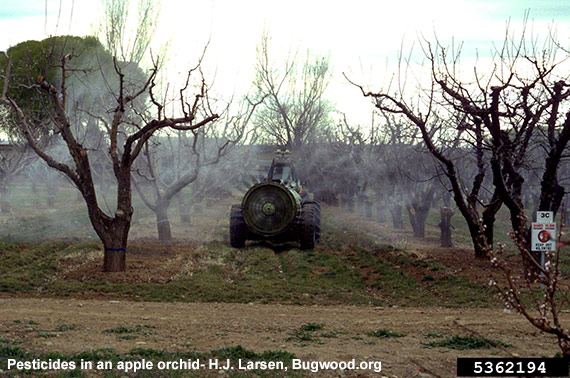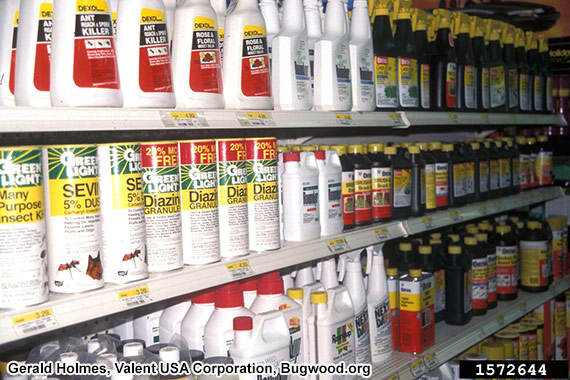What is the difference between pesticides, insecticides and herbicides?
Pesticides are chemicals that may be used to kill fungus, bacteria, insects, plant diseases, snails, slugs, or weeds among others. These chemicals can work by ingestion or by touch and death may occur immediately or over a long period of time.
Insecticides are a type of pesticide that is used to specifically target and kill insects. Some insecticides include snail bait, ant killer, and wasp killer.
Herbicides are used to kill undesirable plants or “weeds”. Some herbicides will kill all the plants they touch, while others are designed to target one species.
Pesticide Effects on Food Production
As the human population continues to grow, more and more crops are needed to meet this growing demand. This has increased the use of pesticides to increase crop yield per acre. For example, many farmers will plant a field with Soybeans and apply two doses of Roundup throughout the growing year to remove all other plants and prepare the field for next year’s crop. The Roundup is applied twice through the growing season to kill everything except the soybeans, which are modified to be pesticide resistant. After the soybeans are harvested, there is little vegetative cover on the field creating potential erosion issues for the reason that another crop can easily be planted. With this method, hundreds of gallons of chemicals are introduced into the environment every year. All these chemicals affect wildlife, insects, water quality and air quality. One greatly affected “good” insect are bees. Bees play a significant role in the pollination of the foods that we eat. If the bee population was to have a significant decrease in their population, it may have a dramatic effect on the way our food is pollinated and crop yield. Although Roundup or similar herbicides may be a solution for farmers, it is also being linked to the native bee population crash. In China, the native bee population is so low that farmers have to “hand” pollinate all of their crops. Hand pollinating plants is very expensive and takes a very long time to accomplish. Pesticides can also be found in a lot of the foods you eat such as fruits and vegetables. These are sprayed to lessen insect damage and thus improve yield. Think about the fruits and vegetables you have eaten from your local grocery store. Now think of the potential amount of pesticides that are on that produce. The amount and toxicity can vary from each product and which country it is from. That means when you eat your healthy foods, you are ingesting all of the pesticides that have absorbed into the food.

Chemicals in the Air and Drinking Water
Herbicides can infect drinking water and the air we breathe, which in turn can cause many health problems. One billion pounds of pesticides are sprayed annually onto the foods that we eat. It is amazing to think of how many chemicals are bodies are taking in and retaining every year. Chemicals can get in the water from runoff during precipitation events, or they may just enter your drinking water by contamination of your well system and or aquifer. Different studies show that they may cause Parkinson’s, cancer, and miscarriages. They also work as endocrine disrupters, which can cause birth defects in young humans and animals alike. There are specific types of pesticides that are linked to specific health problems. Alachlor may cause eyes, kidney, liver and spleen problems. Atrazine can cause cardiovascular and reproductive problems. Endothall can cause stomach and intestinal problems. Effects from these chemicals may not show symptoms until years after your initial exposure.
Pesticides and Insecticide use on Invasive Species
Most invasive species become established in an area after a disturbance of soils. This is why you can observe multiple invasive species along the roadways and ditches. Each time pesticides or herbicides are used, it dramatically affects the plant community and creates an additional disturbance that allows for invasive species to be introduced and take hold. The more herbicides that are used to kill invasive species, the more disturbances are made for new invasive species to establish themselves. This is an ongoing, cyclic process that in the end introduces more chemicals into the air and water. There are other ways to fight invasive species without spraying chemicals.

What can you do instead of using pesticides or herbicides on your property?
For garden plants:
- Use black tarps or fabric to cover the areas you don’t want plants to grow
- Hand pull unwanted weeds
- Mow or cut unwanted weeds that are in a large area
- Till areas of undesired plant species
- Spray 5% or stronger vinegar on unwanted plants to kill them
- Plant a different variety of plants that will smother and move out the unwanted plants
- Keep weeds from going to seed
For garden insects
- Purchase predatory insects like Green Lacewings that will prey on the targeted species.
- Spread crushed eggshells beneath the targeted plant for slugs, snails and caterpillars Use aromatic herbs, like yarrow, citronella, mint, fennel, catnip, basil, and lemongrass as natural repellents for aphids and other garden insects
- Use beer, salt, flour or vinegar which are bug deterrents that are not toxic to humans
For tree and shrub removal:
- Cut tree or shrub down and remove the stumps or use a stump grinder
Tips to avoid pesticide consumption
- When picking out fruit, make sure you choose fruit that is in season for the time of year
- Learn about the ways that the fruits are grown, fruits planted in water are more likely to involve pesticide use
- Learn about where the produce comes from and if that country allows use of “bad” pesticides/herbicides
- Eat organic foods in your local grocery, farmers markets or that come straight from the organic farmer
- Immerse fruits and vegetables in cold water for a half hour to wash most of the pesticides off. Peroxide or soap and a soft brush can assist in removing surface residue.
- Grow your own fruits and vegetables
- Spread the word about pesticides and herbicides
EPA information on pesticides http://www.epa.gov/iaq/pesticid.html
Pesticide Action Network http://www.panna.org/
Contact Us
| Name | Title | Phone |
|---|---|---|
| Matt Rogotzke | GreenCore | 335-7411 |















 Division of Resource Management
Division of Resource Management